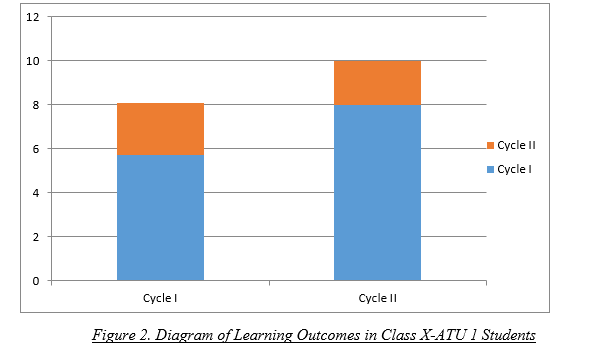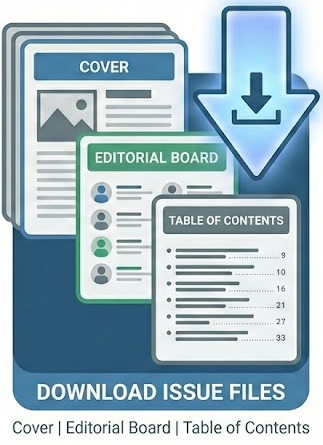Implementation of Student Effectiveness Using Project Based Learning (PJBL) Learning Model to Improve Learning Outcomes in Class X-ATU 1 Students at SMKN 1 Gondang
DOI:
https://doi.org/10.30736/seaj.v6i1.1020Keywords:
Natural Science Learning, learning outcomes, Learning ProcessAbstract
This research was conducted with the aim of improving student learning outcomes using the Project Based Learning (PJBL) learning model in the subjects of Physics Science students at SMK Negeri 1 Gondang. This type of research uses the Classroom Action Research (PTK) method. The subjects are class X-ATU1 students at SMK Negeri 1 Gondang totaling 32 students. This research has a good impact on educational approaches that emphasize learning through real-world projects, where students are actively involved in exploration, collaboration, and problem solving. Real-world relevance and active student engagement are key focuses in PJBL, which encourages the development of critical thinking skills, creativity, and skills. This can be conveyed through the results of cycle I &; cycle II research, in cycle I with 22 students showing a percentage of 68% and carried out again in cycle II there was an increase in learning outcomes with 30 students showing a percentage of 82%. So in this study in cycles 1&2 experienced an increase in student learning outcomes.
Downloads
References
Ahmad Sudrajat. 2008. Development of Psychomotor Assessment Devices. Online.
Anggraini, P. D., &; Wulandari, S. S. (2021). Analysis of the use of project-based learning models in increasing student activity. Journal of Office Administration Education (JPAP), 9(2), 292-299.
Arikunto, S. 2007. ResearchActionClass.Jakarta:BumiAksara.
Eliza, F., Suriyadi, S., &; Yanto, D. T. P. (2019). Increasing students' psychomotor competence through the Project Based Learning (PjBL) learning model at SMKN 5 Padang. INVOTEK: Journal of Vocational and Technology Innovation, 19(2), 57-66.
Ridwan A. Sani &; Sudiran (2012). Improve teacher professionalism through classroom action research. Medan : Cita Pustaka.
Septaria, K., & Rismayanti, R. (2022). The effect of scientific approach on Junior High school students’ Scientific Creativity and Cognitive Learning Outcomes. Jurnal Penelitian dan Pengkajian Ilmu Pendidikan: e-Saintika, 6(3), 173-189.
Septaria, K., Nissak, K., & Wulandari, S. A. (2023). Student Identity and Guided Inquiry Learning in Junior High School Students: A Correlation Analysis. Jurnal Penelitian Pendidikan IPA, 9(10), 8351-8358
Nurika, L., Septaria, K., & Setyaningsih, S. (2024). Implementing Science Creativity In Junior High School Students Using A Pirporsal Learning Model On Energy Resources. INKUIRI: Jurnal Pendidikan IPA, 13(1), 36-41.
Septaria, K., Fatharani, A., Dewanti, B. A., & Utami, Z. R. (2024). Satuan Pendidikan Aman Bencana (SPAB) Berbasis Partisipatory Rural Appraisal di Madrasah Aliyah Sunan Santri Lamongan. TAAWUN, 4(02), 229-240.
Septaria, K. (2022). Kemampuan Bertanya Versus Hasil Belajar Kognitif Mahasiswa: Analisis Korelasi Kemampuan Bertanya Pada Level Mahasiswa IPA. EDUPROXIMA (Jurnal Ilmiah Pendidikan IPA) Universitas Bhinneka PGRI Tulung Agung, 4(2), 60-71.
Sholekah, A. W. (2020). Increased motivation and learning outcomes of science environmental pollution material through the PjBL model of grade VII students of SMPN 9 Salatiga. Journal of Mathematics and Natural Sciences Education, 10(1), 16-22.
Septaria, K. (2023). MEDIA ULAR TANGGA DAN LITERASI: ANALISIS PENGARUH PADA MATERI MITIGASI BENCANA BANJIR PADA SISWA SEKOLAH MENENGAH PERTAMA. SPEKTRA: Jurnal Kajian Pendidikan Sains, 9(1), 1-13.
Sugiharto, N. C. D., Listyaningsih, L., &; Sujatmiko, T. (2023). Increasing Student Interest and Learning Outcomes with Project Based Learning (PjBL) at SMK Negeri 2 Bojonegoro. Journal on Education, 6(1), 3256-3264.
Suprihatiningrum, J. (2013). Learning Strategies, Theories and Applications. Yogyakarta: Ar-Ruzz Media.
Qolbyatin, N. A., Septaria, K., & Wulandari, S. A. (2023). Quartet Learning Media and Student Argumentation: Development Analysis and Correlation in Science Learning in Junior High Schools. INSECTA: Integrative Science Education and Teaching Activity Journal, 4(2), 138-150.
Trianto. (2014). Designing Innovative, Progressive and Contextual Learning Models. Jakarta: Prenadamedia Group.
Wiriaatmadja, R. (2009). Research MethodsClass Action.Bandung:PT. Teenager. Rosdakarya.

Downloads
Published
How to Cite
Issue
Section
License
Copyright (c) 2024 Imega Syahlita Dewi, Denny Dwi Purnomo

This work is licensed under a Creative Commons Attribution-ShareAlike 4.0 International License.
Authors who publish with this journal agree to the following terms:
- Authors retain copyright and grant the journal right of first publication with the work simultaneously licensed under a Creative Commons Attribution-ShareAlike 4.0 International License that allows others to share the work with an acknowledgment of the work's authorship and initial publication in this journal.
- Authors are able to enter into separate, additional contractual arrangements for the non-exclusive distribution of the journal's published version of the work (e.g., post it to an institutional repository or publish it in a book), with an acknowledgment of its initial publication in this journal.
- Authors are permitted and encouraged to post their work online (e.g., in institutional repositories or on their website) prior to and during the submission process, as it can lead to productive exchanges, as well as earlier and greater citation of published work (See The Effect of Open Access).

This work is licensed under a Creative Commons Attribution-ShareAlike 4.0 International License.








